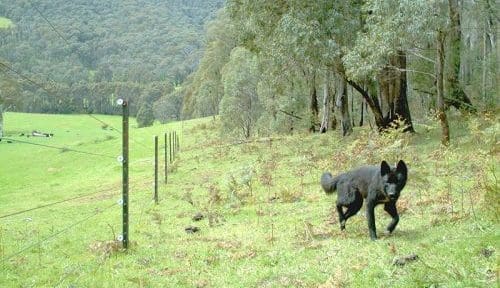Concerns that a lack of dingo controls will lead to their spread across Victoria.. Image: DEPI
FEARS that a lack of future control of dingoes or wild dogs in Victoria would lead to their spread into new farming and peri-urban areas across the state has prompted a call for statewide participation in State Government feedback sessions next month.
Victorian livestock producers and pet owners concerned about the potential spread of dingoes or wild dogs across the state have been urged to attend the government-run feedback sessions on dingo conservation and management.
The State Government is reviewing dingo management, including an unprotection order in north-east Victoria set to expire on October 1, that allowed control activities on specified private land and in a 3km buffer zone on public lands.
The unprotection order was lifted for north-west Victoria in March due to dingo extinction fears, but it has meant no wild dog management or control permit protection for livestock producers, leading to a reported increase in attacks on sheep.
Dingoes are listed as a threatened species under Victoria’s Flora and Fauna Guarantee Act 1988 and are protected under the Wildlife Act 1975.
Minister for Agriculture Ros Spence and Minister for Environment Steve Dimopoulos yesterday announced face-to-face and online consultation as part of the review, urging input from farmers, traditional owners and environmental groups.
 “It’s important we get this right,” Ms Spence said.
“It’s important we get this right,” Ms Spence said.
“That’s why we’re making it a priority to listen to the community before we make a decision.
“We want to hear from farmers impacted by predation as part of this consultation process and use their feedback to help shape the settings that will protect livestock,” she said.
Mr Dimopoulos said the government wanted local knowledge and expertise to form part of this review as it worked towards “a future that appropriately balances the conservation of dingoes with the protection of livestock.”
“The dingo population in north-west Victoria is under threat of extinction, that’s why we’re making these changes to protect an important part of the ecosystem,” he said.
The government said the consultation will take place in early September and include five in-person sessions for farmers across regional Victoria and one online, building on previous surveys and consultation and to appropriately balance the protection of livestock and the conservation of dingoes. The targeted consultation will seek feedback on the economic and social impacts of the dingo unprotection order.
The face-to-face sessions are scheduled for Wednesday 4 September at Omeo (Gippsland) 8.30 am – 10.30 am, Gelantipy (Gippsland) 3pm – 5pm and Hopetoun ( Northwest) 11am – 1 pm. On Thursday 5 September at Tallangatta (Northeast) 2pm – 4pm and on Friday 6 September at Mansfield (Northeast) 10am – 12pm.
‘They will be chewing on their pets’
Victorian representative on the National Wild Dog Action Plan committee Peter Star said all landholders concerned about the spread of wild dogs across the state should attend the in-person sessions.
“If this goes against us and the unprotection order is lifted it basically means that whatever wild dog control there is will be limited to private land.
“We will probably be under the same restrictions as in the north-west,” he said.
“Given that there is a substantial wild dog population in the east, it would be hard for them to say that population is engendered, so you would think that they would have to allow farmers the right to control wildlife; to give permits to shoot dogs.
“But what if they don’t?”
Mr Star said if the government did not allow control permits for dingoes in east, the dogs would roam across the countryside.
“They will infiltrate themselves into parkland and into state parks where there are no dogs.
“From the north-west they are going to go into the Little Desert, from there into the Grampians and from the Grampians they are going to head into the Otways,” he said.
“You ill find them everywhere.
“The reality is they will be in people’s backyards and they will be chewing their pets; their pet dogs as much as anything,” Mr Star said.
“They don’t get it.”
Mr Star said livestock producers were not trying to exterminate the dingo population.
“We just want them controlled; we’re not exterminators.”
National Wild Dog Management Co-ordinator Greg Mifsud also urged producers to attend the feedback sessions.
“And not only those that have been immediately dog-affected.
“Anyone who runs sheep or livestock in eastern Victoria needs to get to these meetings to highlight the importance of the current Victorian Wild Dog Management Program, because if that’s removed, everyone is going to be impacted within no time,” he said.
“Landholders who aren’t dog-affected now can’t be complacent on this issue, because if the dingo is fully protected or that wild dog program is removed, then wild dogs are going to be every livestock producer’s issue in Victoria in no time.
“If they remove the unprotection order there is no way that they will be able to control dingoes nor their impacts,” he said.
“It’s the people who are 5 kms away from the public land buffer or the ones in Benalla – all of those areas that run large numbers of sheep – that are being protected by the landholders closer to the boundary who are doing their bit and the dog program.”
Mr Mifsud said the dogs can travel 200-300 kms in weeks.
“We’ve had dogs in western Queensland travel 650 kilometres in four weeks, so if dogs breed up in big numbers and their density increases in public lands, they have nowhere else to go but private land.
“And they will keep spreading out, it could be a matter of one to two years and dingoes could be across the entire state and no livestock producer will be safe,” he said.
Mr Mifsud said the dogs of people in pre-urban areas, on the outskirts of regional centres and townships would be threatened.
“This is a bigger issue than just primary producers.
Mr Mifsud said the Yarra Valley thoroughbred horse breeding industry would also be at risk.
”Heaven forbid a dingo puts the next Melbourne Cup winner through a fence and breaks its legs.”
The Victorian Government has not released the full results of recent livestock predation survey, but Agriculture Victoria has said the survey showed that many landowners would like a further opportunity to meet in person to discuss how they are impacted by current regulatory settings and to provide views on how Victoria could achieve a balance between dingo conservation and predation management. Mr Mifsud said landholders expected to see the full results of the survey and said there was already a balance between conservation and predation in the current Victorian Wild Dog Management Plan.
“They’ve already got the balance, they just want to ignore it.
“The current program is an effective sustainable wildlife management program providing significant habit and landscape for dingoes to breed and provide whatever ecological role they can, while being controlled before they cause impacts on adjoining properties,” he said.
“There is no necessity to look at any changes to the current program.”
Mr Mifsud said the consultation was announced 11 months ago, but is occurring four weeks before a decision needs to be made.
“That’s 11 months of frustration anxiety and concern among landholders – there producers have been left to hang out there for 11 months.
“But I would encourage landholders to manage their frustrations so that the discussions are held in constructive manner, while make their points very clearly.”
To find out more about the consultation visit, agriculture.vic.gov.au/dingoreview.









